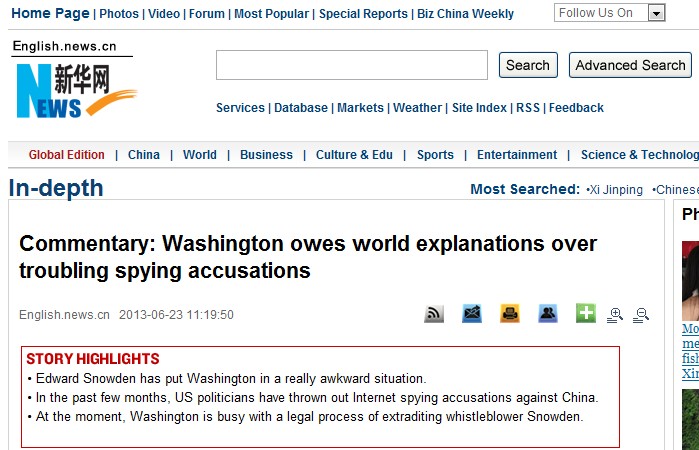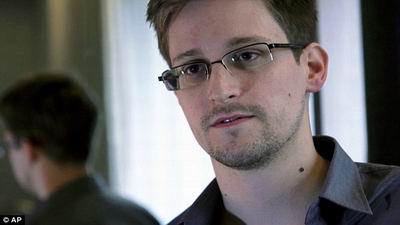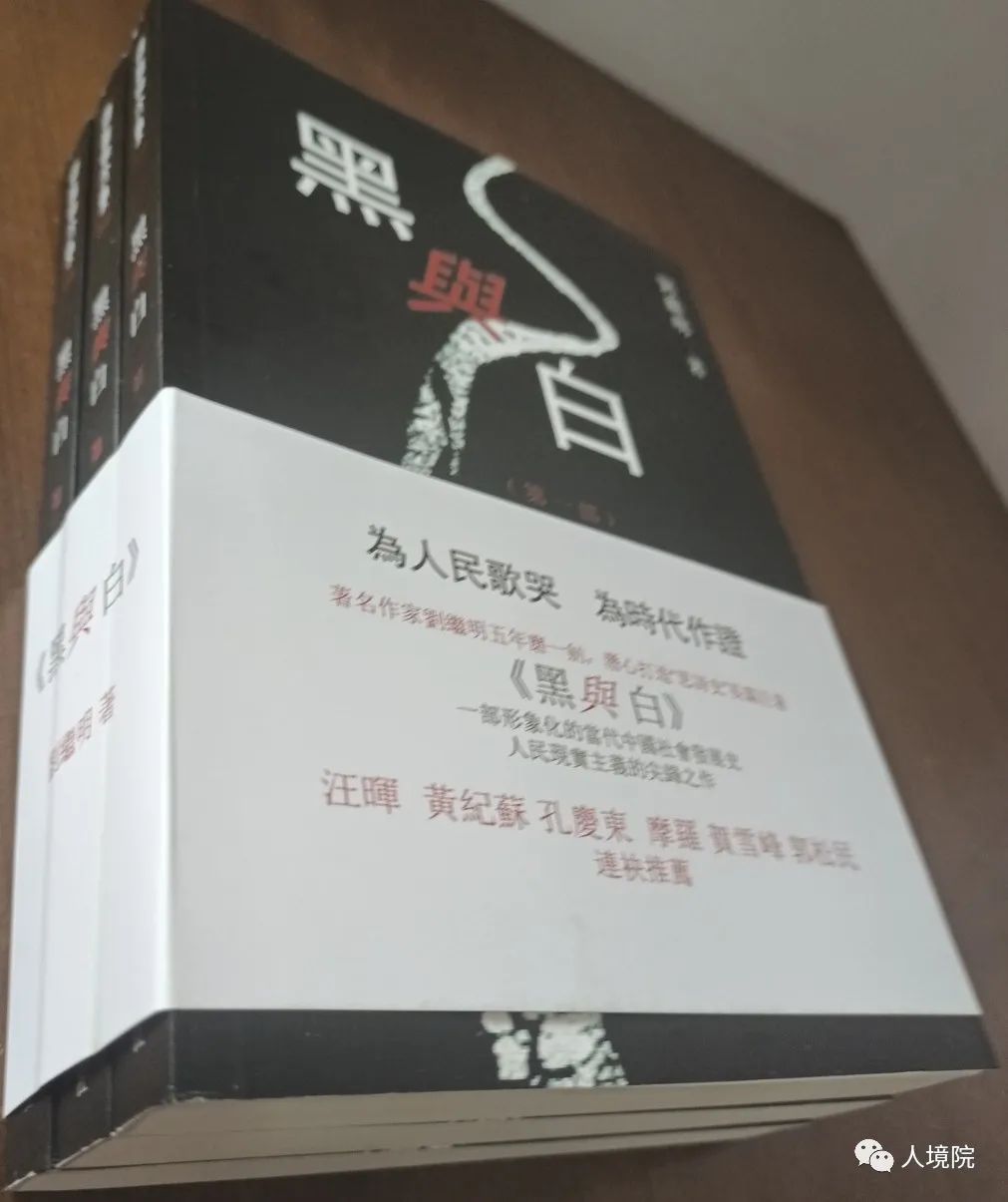6月23日,新華社在其英文網(wǎng)站上發(fā)表一篇名為《華盛頓在間諜指控案上欠全世界一個(gè)解釋》的評(píng)論。
這篇文章是在6月22日晚《南華早報(bào)》(South China Morning Post)的最新報(bào)道后發(fā)表的。《南華早報(bào)》網(wǎng)站援引“泄密者”斯諾登的話稱,美國(guó)國(guó)家安全局(NSA)“無(wú)所不為,從侵入中國(guó)手機(jī)運(yùn)營(yíng)商,到竊取你的所有短信數(shù)據(jù)”,在今年1月還侵入位于清華大學(xué)的中國(guó)電信主干網(wǎng)絡(luò)之一。
“這些爆料加上先前的指控,無(wú)疑是令人憂慮的跡象。 它們表明,長(zhǎng)久以來(lái)試圖扮演成網(wǎng)絡(luò)攻擊無(wú)辜受害者的美國(guó),才是我們這個(gè)時(shí)代最大的惡棍。”新華社在這篇評(píng)論中稱。(These, along with previous allegations, are clearly troubling signs. They demonstrate that the United States, which has long been trying to play innocent as a victim of cyber attacks, has turned out to be the biggest villain in our age.)
英國(guó)《金融時(shí)報(bào)》稱,該文的嚴(yán)厲措辭與中國(guó)政府迄今在斯諾登事件上表現(xiàn)出的謹(jǐn)慎態(tài)度形成鮮明對(duì)比。 這個(gè)跡象表明,此事可能給全球第一和第二大經(jīng)濟(jì)體之間的關(guān)系增添壓力。
中國(guó)方面做出更嚴(yán)厲的表態(tài)之前,美國(guó)正式指控斯諾登觸犯間諜法和竊取政府財(cái)產(chǎn),并要求斯諾登藏身所在的中國(guó)特別行政區(qū)香港將其引渡回美國(guó)。但香港政府表示,斯諾登已通過(guò)合法途徑離港、前往俄羅斯。
新華社社評(píng)提出,美國(guó)政府應(yīng)當(dāng)“全盤交代它的記錄。它還欠中國(guó)和其他據(jù)稱受其監(jiān)視的國(guó)家一個(gè)解釋。它必須向全世界公布其秘密黑客侵入計(jì)劃的范圍、程度和意圖。(”...for other countries, Washington should come clean about its record first. It owes too an explanation to China and other countries it has allegedly spied on. It has to share with the world the range, extent and intent of its clandestine hacking programs.)
新華社還首次明確表示,斯諾登事件對(duì)中國(guó)有利——之前專家們只是在私下表達(dá)過(guò)這一觀點(diǎn)。新華社稱:“圍繞斯諾登事件的戲劇故事,實(shí)際是傾向支持了中國(guó)在網(wǎng)絡(luò)安全問(wèn)題上的立場(chǎng)。”要知道,就在美國(guó)加大力度公開指責(zé)中國(guó)頻繁實(shí)施政府支持的黑客和網(wǎng)絡(luò)間諜活動(dòng)之際,斯諾登決定將“棱鏡”(Prism)計(jì)劃的詳情公諸于眾,稱美國(guó)國(guó)家安全局收集了海量互聯(lián)網(wǎng)和電話通訊數(shù)據(jù)。
華盛頓方面之所以指責(zé)中國(guó),意在迫使中國(guó)政府接受網(wǎng)絡(luò)空間的一些“道路規(guī)則”,包括承諾禁止以電子方式盜竊美國(guó)企業(yè)的知識(shí)產(chǎn)權(quán)。
新華社的這篇社評(píng)以和緩的語(yǔ)氣收尾,重申了長(zhǎng)期以來(lái)的立場(chǎng),即中美均為黑客活動(dòng)的受害者,應(yīng)當(dāng)交流各自的疑慮。
“從善意出發(fā),各國(guó)甚至可以確立起有助于界定和管束互聯(lián)網(wǎng)活動(dòng)的特定規(guī)則,以及在產(chǎn)生摩擦?xí)r化解分歧的機(jī)制。”
“現(xiàn)在,球在華盛頓一邊了。”
原文:
by Ming Jinwei
BEIJING, June 23 (Xinhua) -- Edward Snowden, a U.S. intelligence contractor who divulged some of the most secretive spying activities of the U.S. government, has put Washington in a really awkward situation.
In the past few months, U.S. politicians and media outlets have thrown out Internet spying accusations one after another against China, trying to make it as one of the biggest perpetrators of Internet spying activities.
And those claims were even highlighted during a highly anticipated summit between Chinese President Xi Jinping and his U.S. counterpart Barack Obama held earlier this month in California, which had been designed to help the world's two biggest economies to build a new type of major power relations.
All this has seemed to go relatively well until the revelation of the U.S. National Security Agency's PRISM surveillance program.
According to Snowden, the U.S. government has engaged in wide-ranging dubious spying activities not only on its own citizens, but also on governmental, academic and business entities across the world.
Latest reports from Hong Kong-based South China Morning Post, which seems to have access to Snowden after he fled to the Chinese territory, revealed that Washington has hacked into the computer systems of major Chinese telecom carriers and one of the country's top universities.
These, along with previous allegations, are clearly troubling signs. They demonstrate that the United States, which has long been trying to play innocent as a victim of cyber attacks, has turned out to be the biggest villain in our age.
At the moment, Washington is busy with a legal process of extraditing whistleblower Snowden.
But for other countries, Washington should come clean about its record first. It owes too an explanation to China and other countries it has allegedly spied on. It has to share with the world the range, extent and intent of its clandestine hacking programs.
The drama around Snowden also tends to support China's stand on the issue of cyber security.
Both the United States and China, together with many other countries, are victims of hacking. For the uncharted waters of Internet age, these countries should sit down and talk through their suspicions.
With good intentions, they can even work for the establishment of certain rules that help define and regulate Internet activities and mechanisms that can work out their differences when frictions do arise.
The ball is now in Washington's court. The U.S. government had better move to allay the concerns of other countries.
相關(guān)文章
「 支持烏有之鄉(xiāng)!」
您的打賞將用于網(wǎng)站日常運(yùn)行與維護(hù)。
幫助我們辦好網(wǎng)站,宣傳紅色文化!
歡迎掃描下方二維碼,訂閱烏有之鄉(xiāng)網(wǎng)刊微信公眾號(hào)








